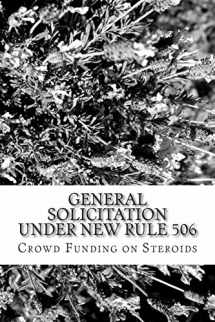
General Solicitation under New Rule 506: Crowd Funding on Steroids (Private Placements)
ISBN-13:
9781492190165
ISBN-10:
1492190160
Edition:
2nd
Author:
Douglas Slain
Publication date:
2013
Publisher:
CreateSpace Independent Publishing Platform
Format:
Paperback
68 pages
FREE US shipping
Book details
ISBN-13:
9781492190165
ISBN-10:
1492190160
Edition:
2nd
Author:
Douglas Slain
Publication date:
2013
Publisher:
CreateSpace Independent Publishing Platform
Format:
Paperback
68 pages
Summary
General Solicitation under New Rule 506: Crowd Funding on Steroids (Private Placements) (ISBN-13: 9781492190165 and ISBN-10: 1492190160), written by authors
Douglas Slain, was published by CreateSpace Independent Publishing Platform in 2013.
With an overall rating of 4.2 stars, it's a notable title among other
books. You can easily purchase or rent General Solicitation under New Rule 506: Crowd Funding on Steroids (Private Placements) (Paperback) from BooksRun,
along with many other new and used
books
and textbooks.
And, if you're looking to sell your copy, our current buyback offer is $0.31.
Description
The new Rule 506 changes everything. The SEC has lifted an 80-year ban on general solicitation pursuant to Section 201(a) of the JOBS Act. Issuers for the first time can use public advertising to sell private offerings. Start-ups and other companies are now able to use advertising and general solicitations to fund private placements. The new Rule 506 may prove to be the answer to the prayers of some start-ups frustrated with existing fund sourcing platforms. It also has hidden dangers that will cause many issuers to use the “old Rule 506.” Among the new Rule 506 strengths, observe: • The amount that can be raised is unlimited • There is no requirement for review of the offering under any Blue Sky laws • There is no review of the offering by the SEC • Solicitations can be online or offline • Solicitations can be made to anyone! Sales (as opposed to solicitations) must be to accredited investors, and issuers must be able to verify that any actual investor is “accredited.” Also, proposed rules will require issuers to send the SEC all marketing copy. Now, we will start to see the following: • Emails asking if you might be interested in learning about a stranger’s project • Videos of founders and entrepreneurs soliciting your interest in their projects • Links on websites inviting you to click through to learn more about an investment • Mobile apps with increasingly creative solicitations Q: How have private offerings been sold historically? Rule 506 of Regulation D establishes a “safe harbor” under Section 4(a) (2) of the Securities Act of 1933 for sales of securities not involving a public offering. Compliance with Rule 506 means an issuer does not need to register with the SEC or any state neither securities regulator, nor does it need to file reports with the SEC, other than a Form D within 15 days of the first sale of any offering. Under the existing Rule 506 exemption, which some issuers will opt to continue to use, an issuer may sell an unlimited number of securities under the following conditions: • the issuer may not use general solicitation or general advertising; • the issuer may sell to an unlimited number of accredited investors, but only up to 35 other investors who are “sophisticated”; • if non-accredited investors are included in the offering, additional disclosures are made to them; and • the securities issued are “restricted.” Q: How will most private offerings be sold in the future? The new Rule 506 adds a new subsection (c) that says that an issuer may use general solicitation or general advertising when offering and selling securities as long as: • all purchasers turn out to be accredited investors (or the issuer reasonably believed they are accredited at the time of sale); • the issuer takes reasonable steps to verify the accredited investor status of each purchaser; and • the issuer complies with other applicable provisions of Regulation D. Q: How has verification occurred until now? Issuers have relied on the investor’s representation that he or she is an “accredited investor” under one of the categories in Rule 501(a). Q: How will verification occur now? Under the new rules, issuers must take “reasonable steps to verify the accredited investor status.” New Rule 506(c) (2) (ii) includes several non-exclusive methods to satisfy the verification requirement.


We would LOVE it if you could help us and other readers by reviewing the book
Book review

Congratulations! We have received your book review.
{user}
{createdAt}
by {truncated_author}


